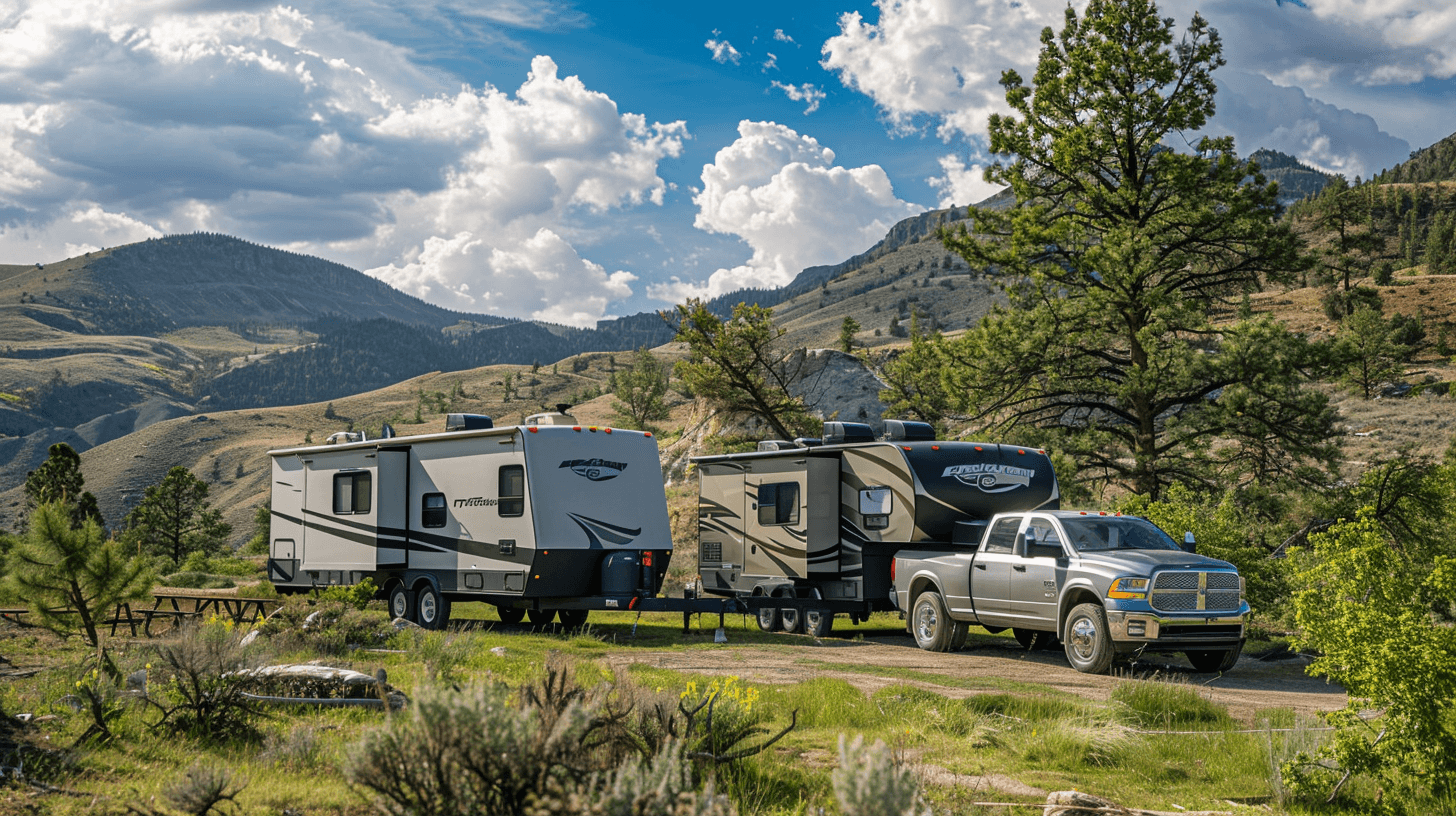Choosing between a travel trailer and a fifth wheel can pose a challenge. Both options have a unique set of benefits and challenges, and understanding these can be key to making the best choice for your needs and lifestyle.
Ultimately, the choice between a travel trailer and a fifth wheel depends on factors such as budget, towing capacity, and the desired level of comfort and convenience for the journey ahead. Let’s dig in to see how you can choose.
Try Before You Buy: RVs For Rent Near You
The Long and Short Of It
Travel trailers are a popular option for those seeking a more versatile and affordable RV experience. They are typically towed by a bumper hitch, making them compatible with a variety of tow vehicles. Travel trailers come in various sizes and layouts, offering flexibility for different camping scenarios.
Fifth wheels provide a more spacious and luxurious living space, as they typically have a raised front section that extends over the bed of the towing truck. This design allows for larger interiors and often includes amenities like multiple bedrooms and bathrooms.
Cost Comparison
Here are the various general costs to compare when exploring a travel trailer versus a fifth-wheel purchase:
Purchase Price:
- Travel Trailers: Generally more budget-friendly, with prices ranging from $10,000 to $50,000 depending on size, features, and brand.
- Fifth Wheels: Tend to have a higher upfront cost, typically ranging from $30,000 to $150,000 or more due to their larger size and additional amenities.
Towing Vehicle:
- Travel Trailers: Can be towed by a variety of vehicles, including SUVs and light trucks. Minimal need for a specialized tow vehicle, potentially saving on additional expenses.
- Fifth Wheels: Usually require a heavy-duty pickup truck with a fifth-wheel hitch (check out these small fifth-wheel campers that don’t always require a heavy-duty truck), which may necessitate an additional investment in a suitable towing vehicle.
Maintenance Costs:
- Travel Trailers: Generally lower maintenance costs due to their smaller size and simpler systems. Routine maintenance and repairs may range from $500 to $2,000 annually, depending on usage and upkeep.
- Fifth Wheels: Larger size and more complex layouts can result in higher maintenance costs. Annual maintenance and repair expenses may range from $1,000 to $5,000 or more, depending on factors such as age and overall condition.
Resale Value:
- Travel Trailers: Generally depreciate faster than fifth wheels, leading to a potentially lower resale value over time.
- Fifth Wheels: Tend to hold their value better due to their higher-end features and amenities, resulting in a potentially higher resale value.
Insurance:
- Travel Trailers: Insurance premiums are usually lower due to the lower overall value and less specialized towing requirements.
- Fifth Wheels: Higher overall value and the need for a specific towing vehicle may result in higher insurance premiums.
It’s important to note that these figures are approximate and can vary based on individual circumstances, location, and the specific make and model of the RV.

Towing Requirements
Another crucial consideration is the towing requirements. Depending on the size and weight of your trailer, you’ll need a suitable truck to tow it. Generally, travel trailers require a 1/2-ton truck, while most fifth-wheel trailers need at least a 3/4-ton truck.
Check out these smaller fifth-wheel trailers that might not require a heavy-duty truck.
The difference in towing requirements is partly due to how each type of trailer distributes its weight. Fifth-wheel trailers need about 25% of their weight to be on the kingpin, which connects the trailer to the truck bed. In contrast, travel trailers can manage with just 10% of the trailer’s weight on the bumper hitch.
- Travel trailers: 10% weight on bumper hitch
- Fifth wheels: 25% weight on kingpin
This difference in weight distribution can affect not only the type of vehicle you need but also the overall towing experience.
Advantages and Disadvantages
We have discussed the basic aspects of cost, towing requirements, and fuel efficiency. Now, let’s explore the benefits and drawbacks of both travel trailers and fifth wheels.
Travel trailers are often appreciated for their cost-effectiveness, lightweight design, and straightforward towing requirements. Their lower profile also means less wind resistance on the road, which can contribute to better fuel efficiency. Travel trailers also tend to be more versatile in terms of the towing vehicle; you can use a truck, an SUV, or even some larger cars, depending on the trailer’s size and weight.
On the flip side, travel trailers can be less steady on the road due to their bumper pull design. They also offer less living space compared to fifth wheels, which can be a disadvantage for longer trips or larger families.
Fifth wheels, however, often feel more akin to a home on wheels. They offer more living space with split-level designs, often including a separate master bedroom, and provide more storage space. The hitch design also makes fifth wheels more steady on the road and easier to handle, especially in reverse.
However, fifth wheels do come with higher costs, not only in terms of purchase price but also maintenance. Their larger size and weight require a more powerful truck to tow, which can be a significant additional cost if you don’t already own one. Finally, the higher profile of fifth wheels makes them less fuel-efficient and more susceptible to wind resistance.
To summarize:
Travel Trailers:
- Pros: More cost-effective, lightweight, versatile towing options.
- Cons: Less steady on the road, less living space.
Fifth Wheels:
- Pros: More living and storage space, more steady and easier to handle.
- Cons: More costly, require a powerful truck, less fuel-efficient.

Wrapping Up
Choosing between a travel trailer and a fifth wheel is a decision that largely depends on your individual needs, lifestyle, and budget. While travel trailers offer cost-effectiveness and versatility, fifth wheels provide more living space and steadiness on the road.
In the end, the best choice will be the one that aligns with your travel plans, comfort requirements, and budget. Whether you pick the compact convenience of a travel trailer or the spacious luxury of a fifth wheel, both options pave the way to countless adventures on the open road.








